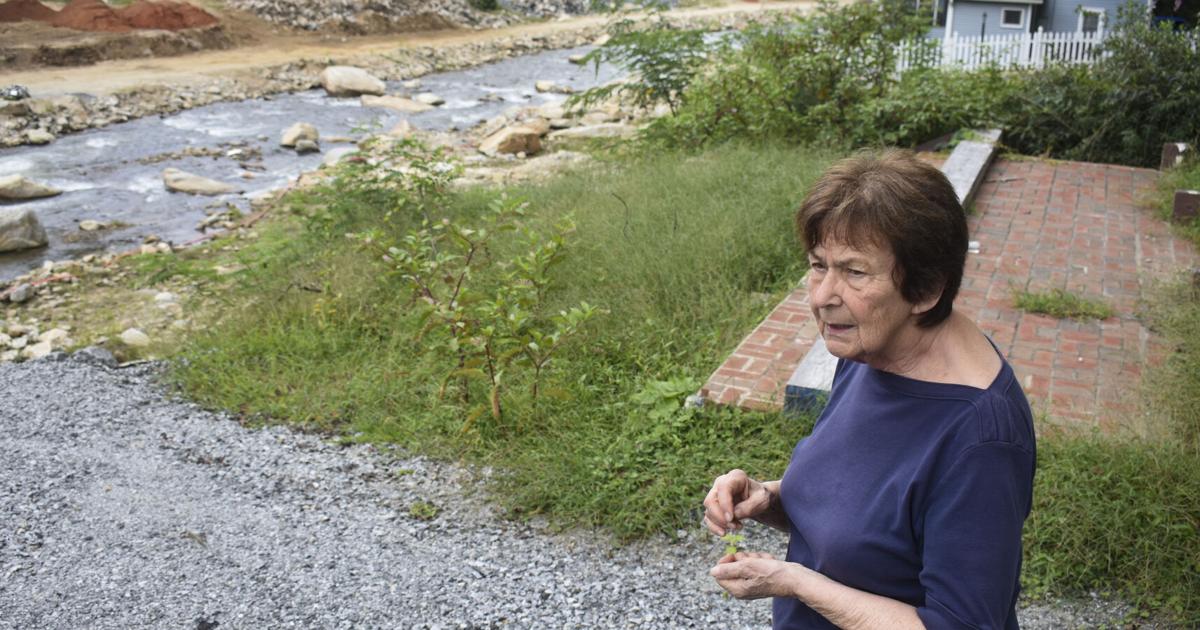Hurricane Helene nearly washed away Chimney Rock. 1 year later, it’s still trying to recover.
By Brandon Lockett/staff,By Glenn Smith
Copyright postandcourier

CHIMNEY ROCK, N.C. – Rose Senehi made her way along the gravel path to a spot where three wicker rocking chairs perched on a jagged bluff above the Rocky Broad River.
The 87-year-old author has spent more than two decades living in this folksy village, penning novels set in the rugged foothills of the Blue Ridge Mountains. But the landscape that greeted her this afternoon seemed as alien as it was familiar.
“There used to be a house here,” she said, pointing at an empty space along the bluff’s edge. “The front door was right over there.”
The home and its contents vanished in a torrent of muddy water that raged through the village on Sept. 27, 2024, as Hurricane Helene carved a path of destruction through western North Carolina.
Helene killed more than 100 people in the Tarheel State and caused an estimated $60 billion in damage to homes, businesses, roads and other infrastructure. It also nearly wiped Chimney Rock off the map.
Gorged on torrential rains, the Rocky Broad swelled into a raging wall of water that swallowed earth, trees, bridges and buildings as it swept through the village of about 140 people. A landslide led to one woman’s death. And an entire section of the commercial district disappeared in the roiling flood waters, transforming lives and landscapes in the process.
The river carried much of the debris into nearby Lake Lure, turning the popular tourist destination into a vast floating dump.
The area is still digging itself out a year later.
More than a million tons of silt, sediment and debris and sediment have been clawed from the lake, carted away by a small army of dump trucks that lumber along the area’s narrow, winding roads. Patches of fresh asphalt bandage hundreds of damaged arteries. Temporary roads and bridges still stitch together communities like Chimney Rock and Bat Cave, reconnecting them to the outside world.
Chimney Rock reopened to the public at the end of July, and officials hope Lake Lure will welcome visitors back to its waters in May 2026. But major repairs remain — work that could run into the hundreds of millions of dollars, local officials said.
Chimney Rock Mayor Peter O’Leary said the village that people remember no longer exists. But its essence remains. It still has the river, the lake and a state park that contains the 535 million-year-old rock formation for which the village is named.
“They’re all still here. They’ve just been changed to some degree, and now our challenge is to figure out what we do with those changes,” said O’Leary, whose family lost one of their two general store buildings in the storm. “How do we move forward from this?”
Helene brings unimaginable flooding and destruction
Senehi relocated to the village from Pawley’s Island 22 years ago after stopping for ice cream one day and falling for Chimney Rock’s craggy charm. She found a fixer-upper “shack” in the shadow of the renowned rock and signed a contract to buy the house that same day.
She was home alone there last Sept. 26, planning to eat dinner and watch a movie, when the local fire chief pounded on her door. He told her the river was rising rapidly. She needed to evacuate.
Rain had soaked the region for days, leaving the ground saturated and the rivers swollen. Helene promised much more precipitation after spinning like a circular saw through Florida, Georgia and South Carolina.
Senehi packed an overnight bag and left. She had no idea it would be two months before she would be able to return home.
Staggering amounts of rain fell in the hours that followed, sending water and mud coursing down the mountains. The Rocky Broad jumped its banks, and a 30-foot crush of water raced through the village.
Videos from that day show buildings, trees and whistling propane tanks cartwheeling down murky rapids. Some 45 buildings were lost, including nearly a third of the village’s businesses. Many more were choked with water and muck. Most lacked flood insurance.
Such was the case with Don Hastings, who had 4 feet of foul water pour into his Willow Creek gift shop, savaging the building and its contents. His other store, Christmas Cottage, was knocked off its foundation, damaging it beyond repair.
Lake Lure’s mayor, Carol Pritchett, grew well-acquainted with hurricanes during her many years living in Houston. But she was stunned by Helene’s sheer power and velocity.
She saw 150-foot trees sail down the river and impale themselves on boats and docks. A small marina near her home took a direct hit.
“It didn’t just rip the boats off,” she said. “It ripped the whole marina off. That was the force of it.”
Rick Spruill, owner of the popular Chimney Rock Brewing Co., couldn’t reach his riverside business in the immediate aftermath of the storm. He worried that he had lost a deck, and maybe some stairs. The truth, he soon learned, was much worse.
The entire building and four neighboring businesses had completely washed away, along with much of the land they’d been built on. The force was such that it changed the very course of the river.
“It was like, ‘What am I looking at?’ It was just like somebody had dropped me on another planet,” he said. “There wasn’t a telephone pole or one unique tree or anything. There was no point of reference at all.”
Charting a path forward
Rebuilding after such devastation would prove to be an arduous process, requiring the assistance of an alphabet-soup of federal and state agencies, utility workers and a brigade of volunteers.
Spokes of Hope, a Christian nonprofit relief group based in Horry County, coordinated the volunteer effort, putting some 3,000 helpers to work cooking, cleaning, delivering supplies and rebuilding. They came from as far away as California and Maine, and included a revolving cast of Amish workers from Pennsylvania who lent their construction skills to the effort.
In the early days, the village lacked power, phone service and running water. The sewer system was out of commission until this summer.
Still, Senehi remembers best the generosity that accompanied the hardship.
The storm wiped out the bridge to her home, and a tree mashed her roof. But a friend offered her a place to stay. Others provided food and clothing. And when she finally returned home, someone donated a portable water supply after learning she had been carting pails from the river to flush her toilet and wash dishes.
“Everybody just took care of everybody,” she said.
Some displaced merchants temporarily relocated to surrounding communities while repairs were underway. Others, such as Chimney Rock Brewing, had no choice but to shut down, possibly for good.
Hastings, the Willow Creek gift shop owner, set up shop 30 miles away in Forest City while battling kidney cancer. One month, he made just $1,800. He kept at it because he had no choice. There were bills to pay and no aid forthcoming from his insurance company or government agencies, he said.
“I either had to get back open or file for bankruptcy,” he said.
With help from the volunteers and donations, Hastings finally returned in August to his refurbished store, which gleamed with fresh flooring, display cases and merchandise. Not far from the Bigfoot T-shirts and ornamental lamps, he placed a poster board with images of Helene’s destruction and a tally of his losses from the storm — nearly $300,000 in all.
The whine of circular saws and the clang of hammers still fill the air along Main Street. But slowly, visitors are returning, eager to support the village’s recovery.
Wayne and Ann Mitchell made the two-hour drive from their home in Edgemoor, Chester County, to help the cause. The couple and their families had been coming to Chimney Rock for generations and wanted to give back.
“It just broke our hearts to see what happened,” Ann Mitchell said.
O’Leary, the mayor, hopes such support will continue as the area rebuilds. Permanent roads and bridges are needed in Chimney Rock. Lake Lure faces big bills to repair its marina, wastewater treatment plant and aging dam. And some businesses still need to find new homes after being washed out.
Chimney Rock has some village-owned land that might go to that cause, with help from state grants. And a preliminary action plan envisions a re-imagined village with a riverside trail and stone terraces, kayaking opportunities, gathering places and commercial spaces. The idea, ultimately, is to turn the disaster into something positive for the community, O’Leary said.
Meantime, Senehi has been busy chronicling Chimney Rock’s recovery in a new book — a historical account she feels obligated to write for posterity.
For her, Helene’s legacy is more than the destruction the storm wrought. It’s about people coming together to help one another when things are at their most bleak and challenging, she said.
“It wiped away the coverings that people put on themselves and revealed their basic kindness and generosity,” she said. “When they see their fellow man has fallen on the ground, they don’t think about politics, they don’t think about anything. They just jump in and pick them up.”



